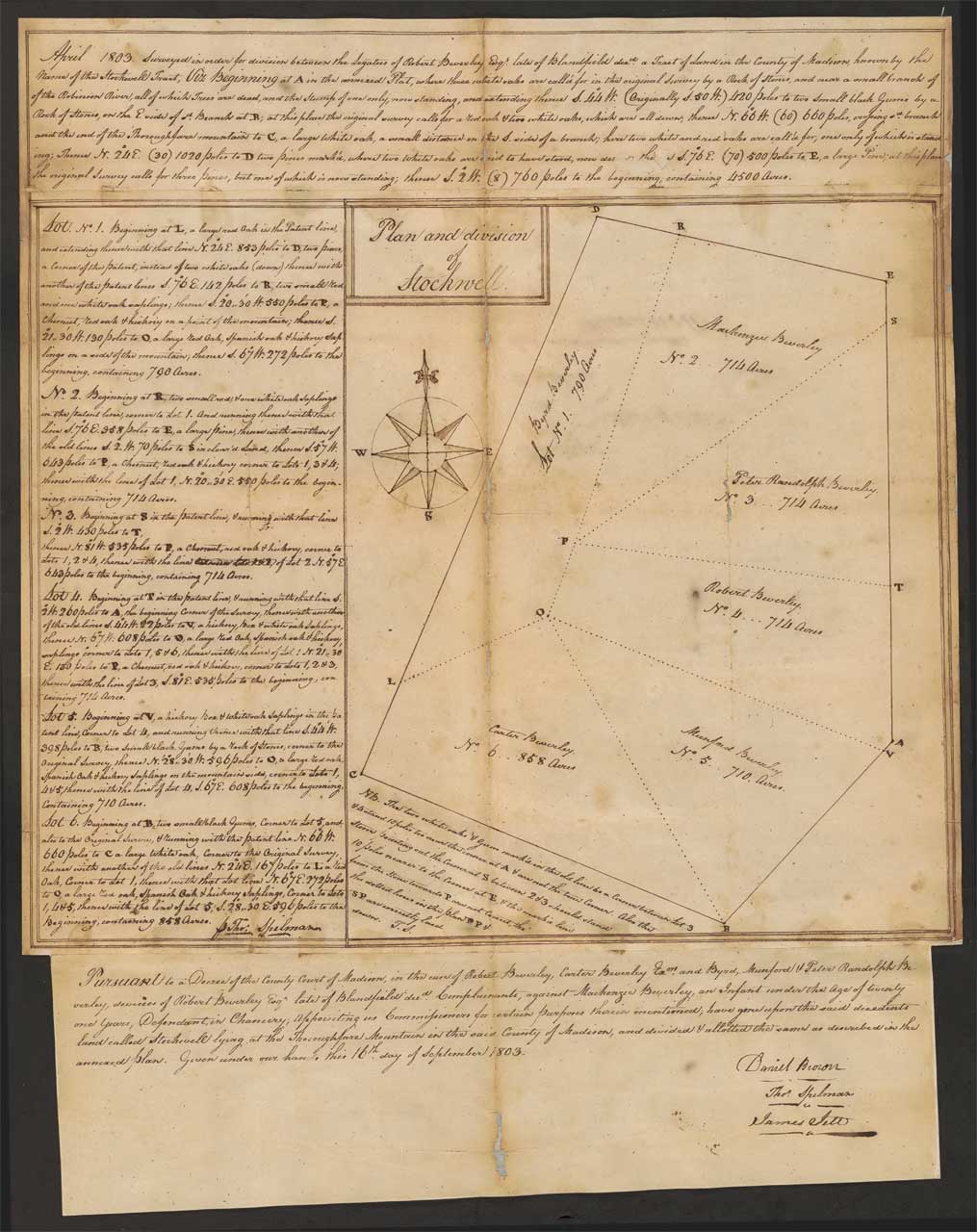The Library of Virginia is pleased to announce that digital images for Madison County (Va.) Chancery Causes, 1794-1912, are now available online through the Chancery Records Index on LVA’s Virginia Memory website. Chancery cases are useful when researching local history, genealogical information, and land or estate divisions. They are a valuable source of local, state, social, and legal history and serve as a primary source for understanding a locality’s history.
Following are a few suits of interest found in the Madison County chancery collection. Exrs. of Robert Beverley vs. Mackenzie Beverley, 1803-003, is a dispute over the estate of Robert Beverley of Blandfield Plantation. Simon B. Chapman vs. John Wright, etc., 1818-002, concerns a contract for substitute militia service during the War of 1812 and discusses some generalities about the war. In Joseph Hume vs. Exrs of Joseph Clark, etc., 1839-004, the court had to differentiate between relatives of Ambrose Clark who were of the “whole blood” and those of the “half-blood.” A genealogical chart illustrating this differentiation was filed with the suit.
One chancery suit of particular interest is Henry Hill vs. Humphrey Taylor, 1844-008. Hill and Taylor were business partners engaged “in the business of buying slaves in the state of Virginia … and selling in the southern part of the United States,” specifically Mississippi and Louisiana. After the partnership dissolved, Hill sued Taylor to recover his fair share of the partnership’s profits.
Hill asked the court to perform an audit of all the partnership’s transactions from the time of its commencement to its dissolution. Documents found in the suit such as Hill’s complaint, Taylor’s rebuttal, depositions, affidavits, commissioners’ reports, and correspondence provide a “behind the curtain” look into the slave trade.
Even more significant are the lists containing the names of hundreds of slaves who were bought in Virginia and sold in Mississippi and Louisiana by Hill and Taylor from 1830 to 1843 (See image numbers 172-189, 194, 206-211). The lists record the names of slaves, purchase price in Virginia, sale price in Mississippi and Louisiana, the date of sale, and the names of individuals who purchased the slaves. The lists do not provide the residence of the slave purchasers; however, a search of the 1840 federal census reveals many of them were residents of East Feliciana Parish in Louisiana. For the slaves making the journey on foot from Madison County, Virginia, to East Feliciana Parish, Louisiana, it was an overland trip of more than 1,000 miles. Although none of slaves provide testimony of their experiences in this chancery suit, their names bear witness to the tragic reality of 19th-century human trafficking.
If you would like to learn more about the American slave trade, the Library of Virginia will co-host a day-long symposium titled “To Be Sold: The American Slave Trade from Virginia to New Orleans” on Saturday, 21 March 2015. Morning sessions will be held at the Library of Virginia in Richmond and simulcast at the Midlo Center for New Orleans Studies at the University of New Orleans, while afternoon sessions will be held at the Midlo Center and simulcast in Richmond. Participants in both locations will be able to engage in a live discussion with attendees and presenters at both sites. Thanks to funding from the National Endowment for the Humanities, participants will be able to attend the event free of charge, but registration is required. To register for the event, click here. The symposium complements the “To Be Sold: Virginia and the American Slave Trade” exhibition at the Library of Virginia through 30 May 2015.
The processing and scanning of the Madison County chancery causes were made possible through the innovative Circuit Court Records Preservation Program (CCRP), a cooperative program between the Library of Virginia and the Virginia Court Clerks Association (VCCA), which seeks to preserve the historic records found in Virginia’s circuit courts.
– Greg Crawford, Local Records Program Manager

















What is also unusual about the Hill vs. Taylor case is that the surnames of quite a few of the slaves are given. I think that some people appear on two lists some with their surnames and then another (such as shown above) of who they were sold to.
Some of the recent chancery causes indexing has shown that it was more common for enslaved persons to carry surnames that we had previously supposed. The majority of enslaved persons did not, but many more than we had anticipated did use a surname, and it was usually not the same surname as the person enslaving them.
Perhaps these indexed names could provide fodder for a research project to determine if this was a regional trait or perhaps a generational one or to help discover some other reason.